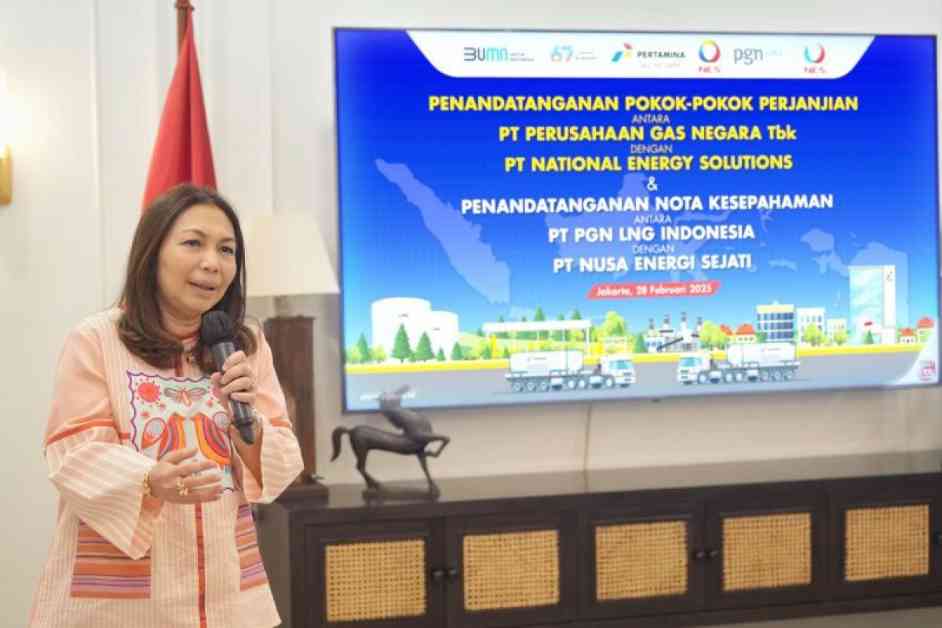PT Perusahaan Gas Negara Tbk (PGN) has taken a significant step in strengthening the domestic gas supply by importing Liquefied Natural Gas (LNG) from the liquefaction facility in Berau Regency, East Kalimantan. This strategic move, in collaboration with PT National Energy Solutions (NES), aims to ensure national energy security and meet the increasing demand for gas in Indonesia.
Ratih Esti Prihatini, the Commercial Director of PGN, emphasized the company’s commitment to seeking new sources of supply to meet the growing gas needs, particularly in the retail LNG segment. “The demand for gas is on the rise, and a reliable supply is crucial. We are also expanding our market to the central and eastern regions of Indonesia, where demand from the industrial and electricity sectors is quite high,” Ratih stated.
As part of this partnership, PGN will sign a LNG Sales and Purchase Agreement (PJBLNG) with NES, with the supplied LNG volume ranging from 350,000 to 700,000 MMBTU per year. The distribution of LNG will span over a period of 5 years from the effective date of the PJBLNG.
Furthermore, PGN’s subsidiary, PT PGN LNG Indonesia (PLI), and NES’s subsidiary, PT Nusa Energi Sejati (NUSA), plan to form a consortium to optimize the LNG Plant NES facilities. Currently, PLI is conducting due diligence on the LNG Plant NES before proceeding with further steps.
Hendradi J. Suryanto, the Director of NES, shared his vision for the project, stating, “We aim to launch the LNG Plant project every two years, with the hope of building around 50 LNG facilities within five years with the support of all parties, including the PGN Group.”
This collaboration is a follow-up to the memorandum of understanding (MoU) signed in September 2023. PGN and NES are committed to maximizing domestic resources and reducing energy imports, aligning with the government’s efforts to enhance national energy security.
In addition, PGN highlights that all LNG business processes will prioritize good corporate governance principles. “Transparent and professional business processes will yield more optimal performance, while also supporting national energy efficiency,” Ratih concluded.
Expert Insights on the Impact of LNG Imports on National Energy Security
To delve deeper into the significance of PGN’s decision to import LNG from Berau, we spoke with Dr. Maya Sari, an energy policy expert at the Institute for Energy Economics and Financial Analysis. Dr. Sari emphasized the importance of diversifying energy sources to enhance national energy security. “By importing LNG from Berau, PGN is not only expanding its supply chain but also reducing the reliance on a single energy source, which is crucial for long-term sustainability,” Dr. Sari explained.
Moreover, Dr. Sari highlighted the potential economic benefits of such collaborations, stating, “Partnerships like the one between PGN and NES can stimulate local economic growth, create job opportunities, and boost the energy sector’s resilience.”
Future Outlook and Challenges in the LNG Industry
Looking ahead, the LNG industry in Indonesia faces various challenges, including regulatory hurdles, infrastructure limitations, and environmental concerns. Experts predict that addressing these challenges will be critical for the sustainable growth of the LNG sector in the country.
As PGN continues to strengthen the domestic gas supply through strategic partnerships and investments, the company is poised to play a pivotal role in shaping Indonesia’s energy landscape. With a commitment to good corporate governance and sustainable practices, PGN is setting a precedent for responsible energy management in the region. The collaboration with NES marks a significant milestone in the company’s journey towards enhancing national energy security and meeting the evolving energy needs of Indonesia.






















